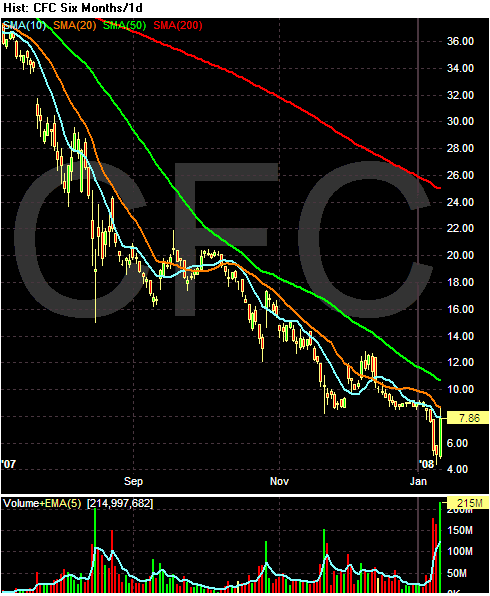1. The Fed is behind the deal. (Today’s thought: It’s as likely as yesterday.)
2. The Fed is behind the deal because the rumors yesterday of a near bankruptcy were probably true. (Based on the price, it would appear more evident than ever.)
3. As part of the deal, the government likely agrees to guarantee BofA against Countrywide-related losses. (There was nothing in the press release about that, so let’s give them the benefit of the doubt and say BofA is shouldering all of the risk and at this price it believes the risk is worth the reward.)
4. Lost in the in the noise yesterday was that Moody’s downgraded the ratings on 30 (count ‘em — THIRTY!) tranches of Countrywide’s mortgage debt by more than a few notches. They did something similar before American Home Mortgage filed for bankruptcy. (Remains as telling today as it was yesterday.)
.....
8. BofA gets a free bank and a put to the government. (Make that a free thrift on the former; unclear on the latter.)
I have no idea if it is true or not. To back up Mr. Greenberg's thesis here are a few facts.
1.) Hank Paulson was a former Goldman "big guy." In other words, the Treasury Secretary probably knows all of the other financial "big guys" out there, so making a few phone calls on private lines is a definite possibility.
2.) Bank of America is already way down on it's initial investment in Countrywide; they are now doubling up on a big losing bet. Barry over at the Big Picture made this observation:
After that initial disastrous buy in at $18-20, BoA is doubling up -- at $6 . . .
3.) Let's look at a chart of Countrywide:

Notice the massive volume spike a few days ago that bankruptcy rumors caused. Countrywide denied these rumors, but to no avail. Now, were they true? The B of A deal indicates they may well have been. Moody's downgrade bolsters this argument.
Let's go back to the fact that Bank of America's original purchase was three times higher than the price they are currently getting for CFC. That's a huge discount and should raise more than a few eyebrows. Remember one of Bonddad's (and practically every other traders) primary rules of trading -- cut your losses. BAC is adding to their losses right now. That's not exactly the smartest move they could make, unless they are getting something for their investment that is worth the loss